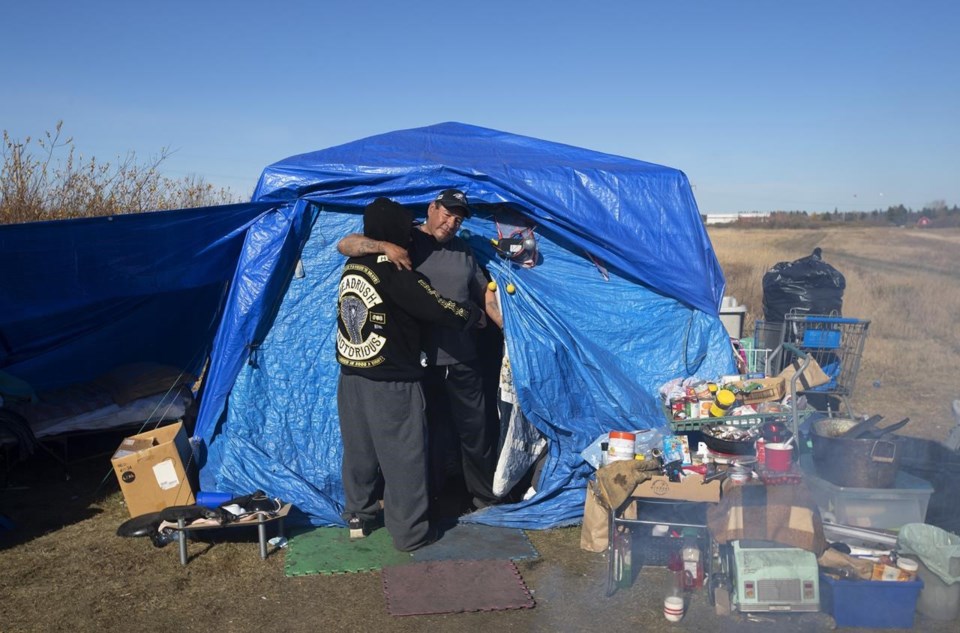Time is running out for a central Alberta city to secure warming shelters for vulnerable individuals living in tattered tents in an open field unprotected from frigid winds and, soon, snow.
Up to 60 people have been sleeping in the homeless camp in Wetaskiwin, southeast of Edmonton, since August after the city closed its only overnight shelter.
The site has been described as "worse than a refugee camp." Health service providers have identified numerous risks, including inadequate sources of warmth, shelter, food and safety.
Camp conditions have grown worse since government funding was stripped from her organization, said Jessica Hutton, executive director of the Open Door Association. Staff are no longer able to offer support around the clock, seven days a week.
"We can't keep going. We have no money," said Hutton. "This isn't how our agency works. We don't abandon people and so, to be forced into a decision where we had to walk away due to funding, is absolutely heartbreaking."
Grant money to Open Door from Wetaskiwin Family and Community Support Services, a cost-shared program between the city and the province, stopped without notice in mid-August, said Hutton.
Wetaskiwin Family and Community Support Services did not respond to a request for comment.
That same month, Wetaskiwin's only emergency housing shelter, the Open Door 24-7 Integrated Response Hub, closed after the city terminated its lease.
Mayor Tyler Gandam has previously told The Canadian Press that concerns from residents about crime, open alcohol, drug use and assault led to the decision. He said Open Door failed to mitigate harms to the community.
The city then barred the agency from entering a homeless camp on city-owned land on Wetaskiwin's outskirts.
Open Door workers continued to support clients by passing medications and provisions over a fence, but the association was bleeding money. A decision to end services was made last month.
"It's the worst decision we have ever had to make," said Hutton. "They've gone from having a roof over their heads, stability, food and medical ... to having to move back out on the street."
A biting cold has already set in overnights. Temperatures as low as -14 C are expected by next week and snow could fall as soon as Sunday.
Since the camp was put up, four clients have died, Hutton said. People living in the "tent city" voiced fears in October that more will die as temperatures drop.
During a city council meeting Monday, Paul Edginton, general manager of community and protective services, said the city is trying to procure warming trailers. It is also working with a proposed shelter operator, which the city declined to name.
Edginton said if the trailer solution fails, "there are no alternate options given the time remaining to get a viable shelter in place."
A working group with Wetaskiwin has done an "exhaustive search" for facilities that could house a shelter. A church was the only option identified, said Edginton. Talks continue.
A special council meeting is scheduled for Friday to provide an update on trailer funding for the homeless camp.
Alberta Health Services has a temporary contract with a local non-profit to ensure there is access to drinking water, food and firewood for the homeless at the camp until a shelter space is secured. The partnership will also support transportation to medical appointments.
Kerry Williamson, a spokesperson for Alberta Health Services, said it's uncommon for the provincial agency to step in with significant support on a primarily municipal issue. Staff have been visiting the site weekly to provide health-care assessments and medical support.
"Providing care at the encampment will become increasingly difficult as the weather grows colder. A reliable means of transporting those who require care to hospital or clinic is necessary in the absence of a shelter on-site," Williamson said in a statement.
"AHS recognizes that the current encampment is not a viable solution."
Public health nurses, mental-health specialists and EMS from the nearby community of Maskwacis are also providing wound care, medication and injury assistance, mental -health support and COVID-19 swabbing and vaccination.
Area legislature member Rick Wilson, who serves as Alberta's Minister of Indigenous Relations, said provincial funding is in place to help the city secure warming shelters and he's confident a solution will be found soon.
Open Door was doing a great job and he's unsure where it "went off track" with the city, he said.
"There's a lot of pieces of the puzzle," he said. "It looks like we're all finally pulling in the same direction and if we keep working together, we'll get a solution."
This report by The Canadian Press was first published Nov. 11, 2021
Alanna Smith, The Canadian Press



